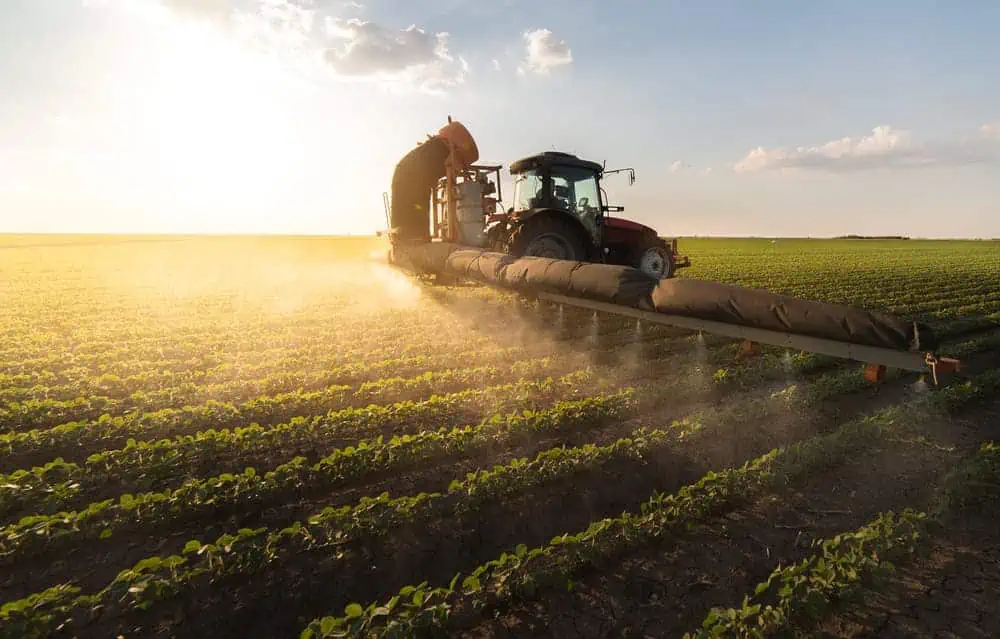What Crops Is Paraquat Used On?
- Last Updated: July 27th, 2023

Attorney Jessica Paluch-Hoerman, founder of TruLaw, has over 28 years of experience as a personal injury and mass tort attorney, and previously worked as an international tax attorney at Deloitte. Jessie collaborates with attorneys nationwide — enabling her to share reliable, up-to-date legal information with our readers.
Legally Reviewed
This article has been written and reviewed for legal accuracy and clarity by the team of writers and legal experts at TruLaw and is as accurate as possible. This content should not be taken as legal advice from an attorney. If you would like to learn more about our owner and experienced injury lawyer, Jessie Paluch, you can do so here.
Fact-Checked
TruLaw does everything possible to make sure the information in this article is up to date and accurate. If you need specific legal advice about your case, contact us by using the chat on the bottom of this page. This article should not be taken as advice from an attorney.
What Crops Is Paraquat Used On?
Paraquat dichloride (usually simply called paraquat but marketed under various brand names, including Gramoxone) is a highly toxic chemical herbicide.
Like Roundup, it is a powerful non-selective contact herbicide, which means that it kills most plants indiscriminately.
Unlike Roundup, however, paraquat is so highly toxic that it can kill plants that have become resistant to other herbicides.

Because of this high level of toxicity, paraquat poses a danger to humans who come into contact with it.
For this reason, the United States Environmental Protection Agency (EPA) issues tight restrictions on its use.
Only licensed users who have undergone special training are allowed to use it.
Furthermore, there are currently no permitted applications for the use of paraquat in residential areas.
Table of Contents
What Dangers Does Paraquat Pose to Human Health?
The immediate dangers of paraquat are undisputed.
The Centers for Disease Control notes that if a person ingests even a very small amount of the herbicide, the results can be fatal.
In many cases, this has happened by accident when paraquat has been transferred into beverage containers for storage, and an unknowing individual has drunk some of the substance as a result.
While swift emergency medical attention can possibly mitigate the damage, there is no antidote for paraquat ingestion.
There are also risks for people who have had contact with herbicides that contain paraquat on their skin, especially if the contact is prolonged or occurs in vulnerable areas such as open wounds.
Additionally, inhaling airborne droplets of paraquat can cause serious damage to the lungs.
In the longer term, many scientists have concluded that exposure to products containing paraquat can lead to a dramatically increased risk of Parkinson’s disease.
Because of this, the manufacturers of paraquat are the target of ongoing Multidistrict Litigation involving hundreds of lawsuits.
This legal action claims that the producers of paraquat products were negligent in marketing and selling a product that is known to have serious health consequences.
Use of Paraquat on American Crops
Paraquat has been mass-manufactured for herbicides used on American crops since the late 1940s.
Despite this litigation and a recent tightening of restrictions on paraquat’s use and handling, farmers in the United States have used far more paraquat in recent years than ever before.
This is in part because of the notorious health concerns around the use of Roundup.
It is also because many weeds have become resistant to herbicides like Roundup, and paraquat is considered to be more effective.
There are four typical ways in which paraquat is applied in agricultural settings:
- To stop unwanted plant or weed growth in the fields of ground crops or fruit tree orchards
- As a pre-harvest desiccation (drying out) method for crops such as cotton
- As a “burndown” method to clear fields completely between harvests
- To kill off entire crops that are unwanted
Paraquat is currently used in fields for more than 100 types of crops and trees.
These include:
- Almonds
- Artichokes
- Citrus fruits
- Corn
- Cotton
- Garlic
- Grapes
- Peanuts
- Pears
- Soybeans
- Strawberries
- Sweet potatoes
- Wheat
Paraquat is also used in non-agricultural settings.
For example, it is often used to clear railways and industrial sites of unwanted plant growth.
How Does Paraquat Exposure Occur?
The scientific community is still learning the various ways in which exposure can happen to humans, as well as the extent and nature of the negative effects of that exposure.
There are still many unknowns about the quantity or size of particles that can cause long-term effects, as well as the amount of time the exposure takes to create serious health issues.
From what scientists currently understand, exposure can occur in the following ways:
- Direct contact with a paraquat product, such as touching or ingestion
- Direct inhalation of paraquat fumes or particles

While this may seem straightforward, it is unclear what proximity is close enough for people to be exposed.
In many of the legal cases brought against the manufacturers of products containing paraquat, the plaintiffs have claimed that they have developed Parkinson’s disease and other neurological disorders after working with paraquat in agricultural settings.
However, there are also many people whose Parkinson’s diagnoses have come about after having worked or lived near farms or orchards in which paraquat was used.
This link has led many people to believe that the chemical particles present a danger for people who are exposed to it at a distance because of drift, runoff, or “crop duster” overspray.
Hold the Manufacturers Accountable and Take a Stand Against Paraquat
If you have worked on, worked near, or lived near agricultural facilities that produce the crops listed above, it may be worth considering whether you or your family have had potential long-term exposure to products containing paraquat.
As long as the use of this herbicide is permitted in the United States, there will continue to be questions about its health effects on people who are unknowingly exposed to its dangers.
If you believe you or a loved one was exposed to paraquat, you may be entitled to compensation for pain and suffering, medical expenses, and lost wages.
TruLaw and their attorneys are investigating paraquat lawsuits today.
Use our instant Case Evaluation tool to learn if you are eligible to file a lawsuit against the manufacturer of paraquat today.

Managing Attorney & Owner
With over 25 years of legal experience, Jessica Paluch-Hoerman is an Illinois lawyer, a CPA, and a mother of three. She spent the first decade of her career working as an international tax attorney at Deloitte.
In 2009, Jessie co-founded her own law firm with her husband – which has scaled to over 30 employees since its conception.
In 2016, Jessie founded TruLaw, which allows her to collaborate with attorneys and legal experts across the United States on a daily basis. This hypervaluable network of experts is what enables her to share the most reliable, accurate, and up-to-date legal information with our readers!
Here, at TruLaw, we’re committed to helping victims get the justice they deserve.
Alongside our partner law firms, we have successfully collected over $3 Billion in verdicts and settlements on behalf of injured individuals.
Would you like our help?
At TruLaw, we fiercely combat corporations that endanger individuals’ well-being. If you’ve suffered injuries and believe these well-funded entities should be held accountable, we’re here for you.
With TruLaw, you gain access to successful and seasoned lawyers who maximize your chances of success. Our lawyers invest in you—they do not receive a dime until your lawsuit reaches a successful resolution!
AFFF Lawsuit claims are being filed against manufacturers of aqueous film-forming foam (AFFF), commonly used in firefighting.
Claims allege that companies such as 3M, DuPont, and Tyco Fire Products failed to adequately warn users about the potential dangers of AFFF exposure — including increased risks of various cancers and diseases.
Depo Provera Lawsuit claims are being filed by individuals who allege they developed meningioma (a type of brain tumor) after receiving Depo-Provera birth control injections.
A 2024 study found that women using Depo-Provera for at least 1 year are five times more likely to develop meningioma brain tumors compared to those not using the drug.
Suboxone Tooth Decay Lawsuit claims are being filed against Indivior, the manufacturer of Suboxone, a medication used to treat opioid addiction.
Claims allege that Indivior failed to adequately warn users about the potential dangers of severe tooth decay and dental injuries associated with Suboxone’s sublingual film version.
Social Media Harm Lawsuits are being filed against social media companies for allegedly causing mental health issues in children and teens.
Claims allege that companies like Meta, Google, ByteDance, and Snap designed addictive platforms that led to anxiety, depression, and other mental health issues without adequately warning users or parents.
Transvaginal Mesh Lawsuits are being filed against manufacturers of transvaginal mesh products used to treat pelvic organ prolapse (POP) and stress urinary incontinence (SUI).
Claims allege that companies like Ethicon, C.R. Bard, and Boston Scientific failed to adequately warn about potential dangers — including erosion, pain, and infection.
Bair Hugger Warming Blanket Lawsuits involve claims against 3M — alleging their surgical warming blankets caused severe infections and complications (particularly in hip and knee replacement surgeries).
Plaintiffs claim 3M failed to warn about potential risks — despite knowing about increased risk of deep joint infections since 2011.
Baby Formula NEC Lawsuit claims are being filed against manufacturers of cow’s milk-based baby formula products.
Claims allege that companies like Abbott Laboratories (Similac) and Mead Johnson & Company (Enfamil) failed to warn about the increased risk of necrotizing enterocolitis (NEC) in premature infants.
Here, at TruLaw, we’re committed to helping victims get the justice they deserve.
Alongside our partner law firms, we have successfully collected over $3 Billion in verdicts and settlements on behalf of injured individuals.
Would you like our help?








